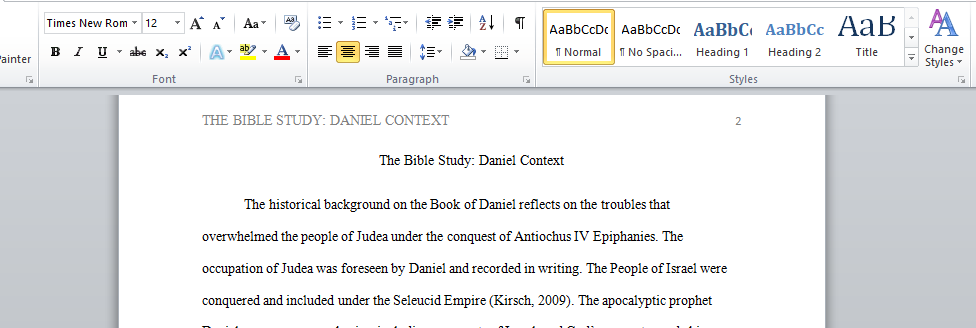How does the book of Daniel respond to its historical context
Make sure you read Kirsch’s chapter “Spooky Knowledge and Last Things,” presents crucial historical background on the Book of Daniel, its writers and original audience, as well as the longer Jewish apocalyptic tradition.
(For additional information, you may also choose to read the selections on Daniel and apocalyptic literature from The Cambridge Companion to the Bible, “The World of the Hebrew Bible” and “Jewish Responses to Greek and Roman Culture.”)
Using the Metacognitive Tools for Critical Reading to help you understand the ideas and information that Kirsch presents: read aloud and talk to yourself as you go, verbalizing your responses to specific passages.
Choose TWO chapters from Daniel, one from the first half (1-6) and one from the second half (7-12), to help you answer the following question:
How does the Book of Daniel respond to its historical context: the influence of Greek Hellenistic culture and/or the rule of Antiochus IV?
This question is intentionally broad, to give you an opportunity to write about the elements of Daniel that you find most interesting. By connecting specific details of the text of Daniel with its larger context, you will be writing your first rhetorical analysis for this class. Remember that the goal of rhetorical analysis is not simply to summarize what the text means, but to make an arguable claim about how the text relates to the world that produced it.
Some tips for getting started:
- Identify one or two tropes in Daniel that you find interesting. Use the Kirsch chapter to help you pick one (see especially p. 22-23).
- Use your chosen trope(s) to select your two chapters. In other words, where does this trope appear somewhere in both the first half and the second half of Daniel?
- Reread these two chapters and pay particular attention to the style, tone, descriptions, symbolism, key plot points and characterizations, etc., especially as they affect how your chosen trope is presented in the text.
- Make some notes about what you find interesting about why this trope appears the way it does in these two chapters. Start with your own personal responses and build out from that.
- Then, make some notes about how you think this trope is connected to the larger context of Hellenistic cultural influence among the Jewish people and/or the crisis provoked by Antiochus. You might focus on one or both of these questions:
- How does this trope reflect or address the concerns of some Jewish people at the time? Or,
- How does this trope comment on the contemporary religious and political situation?
Once you’ve got a sense of these ideas and evidence, you should be able to start writing your response. Before you submit your response, make sure that your analysis is arguable, specific, and well-organized.
Answer preview:

Words:592
